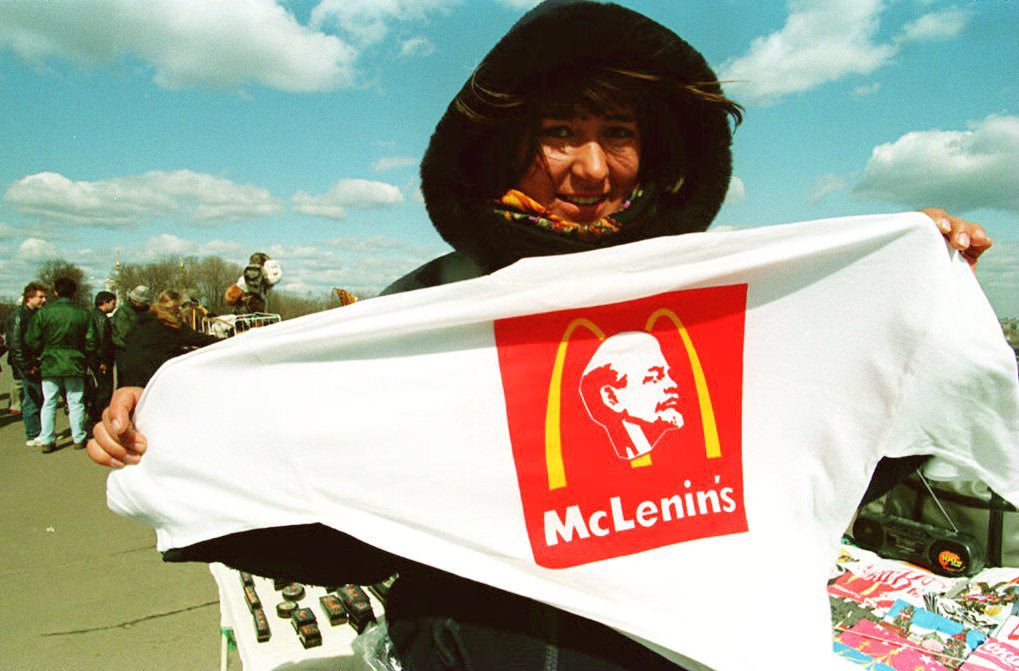McDonald’s leaving Russia is a big deal – and could backfire on the west
With western culture influences now gone, Putin has more opportunity to shape Russia in his own image


When McDonald’s announced it was closing all its restaurants in Russia this week, it was the end of an era. As the cultural chasm between Russia and the west grows wider again, we could be seeing the start of a new Cold War. But rather than isolate Putin, it might play into his hands.
The arrival of McDonald’s was a big event – a BFD, you could say – in Moscow on 31 January 1990. That day, more than 30,000 Russians queued up the first day to get a taste of the “Bolshoi Mak’” breaking a world record. It was a year after the fall of the Berlin wall, and a year before the Soviet Union was dissolved. Change was in the air.
Reporter Yuliya Chernova was there. “Oh, the deliciousness of the milkshake, my first taste of America at the Moscow McDonald’s in the early 1990s,” she tweeted. “While mom waited at the US embassy to submit our refugee papers, grandma & I stood in the snaking McD line.”
The crowds were so large that dozens of policemen were sent to control the commotion. Russians were so unused to seeing smiling people serving them that, according to one account, McDonald’s employees were asked to smile less. With a large population of around 144 million, western companies were clamouring to reach Russians eager for western culture. Call it the arrival of American capitalism or soft power, the point was the same: Russia was integrating into the rest of the west again.
But it was not meant to last.
Western companies now feel they have no choice but to leave again. On Twitter, people called for boycotts of companies for sitting on the fence. Writer Amy Siskind tweeted: “.@McDonalds and @pizzahut say they will continue to do business in Russia. Their immoral choice, and they should face boycotts at home! Drive past, and #BoycottMcDonalds#boycottpizzahut”.
Ukrainian supermarkets also started boycotting western brands that refused to leave. A New York state official warned major companies that they face “significant and growing legal, compliance, operational, human rights and personnel, and reputational risks” by remaining in Russia.
The fast-food giant has 850 stores in Russia and around 62,000 employees. It has been wildly popular across the country. McDonald’s says the move is temporary – but it remains to be seen if that position will last. If the invasion continues beyond a few months, and keeps claiming lots of civilian lives, companies may have to stay out permanently. Moreover, the Russian government is considering ‘nationalising’ McDonald’s restaurants along with assets of other large companies. Who would want to risk going back into Russia anytime soon?
Clearly, Putin has to be sanctioned, and cutting off the Russian government from international trade is appropriate. Western sanctions were necessary. But if anyone thinks this might make Russians think twice about Putin, they are likely to be disappointed. When people feel their country or identity is under attack, they usually grow defensive. The international isolation of Russia may very well play into Putin’s hands.
Take Coca Cola as an example. In 1977 the Indian government threw the iconic brand out of the country for not allowing local manufacturers access to its secret formula. Rather than lamenting Coca-cola’s demise, Indians embraced local brands (Thums Up, Limca, Gold Spot) with enthusiasm. Even after the company returned in 1993, it never quite managed to topple home-grown companies. As one writer put it, “The opening up to the world helped Indians become more aware of their own culture, and thus arose an emotional urge to support deserving Indian brands.”
To keep up to speed with all the latest opinions and comment sign up to our free weekly Voices newsletter by clicking here
American brands didn’t just represent American culture in Russia, they illustrated the strength of capitalism over communism. They showed people another world was possible; that Soviet communism wasn’t the best way to organise society.
Now, the departure of brands like McDonald’s, Coca Cola, Netflix and Starbucks takes away that vision. A generation of Russians will grow up with limited access to western culture and ideas. That doesn’t sound like a positive development to me.
China is another precautionary example. When the communist party banned platforms such as Facebook, Twitter, Whatsapp and Google Search, many thought this would stymie its tech industry. But the government created home-grown alternatives (WeChat, Weibo and Baidu). These companies aren’t as globally powerful as western brands, but they are more easily controlled by the government. By keeping Chinese people within its own sphere of influence, they are less influenced by foreign ideas of democracy and individual liberty.
America is cutting off the very symbols of western culture many Russians liked about it, giving Putin more opportunity to shape Russia in his own image. The west may end up regretting this boycott.

Join our commenting forum
Join thought-provoking conversations, follow other Independent readers and see their replies